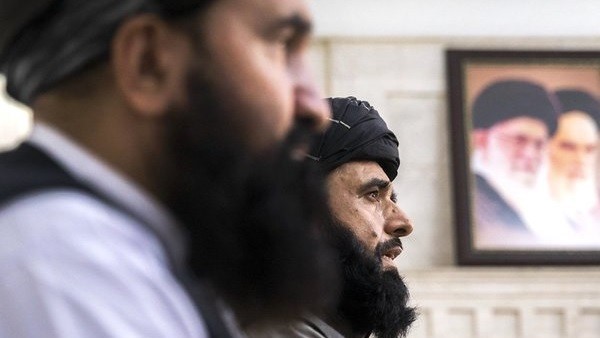Nora Bandari
Tensions have arisen in the past few days between the Iranian regime and its Afghan ally represented by the Taliban, which controls the government in Afghanistan. This is due to Iran’s demand for Kabul to receive its water share from the Helmand River, located in southwestern Afghanistan and eastern Iran, according to an agreement signed between the two governments in March 1973. The agreement stipulates that Afghanistan should release 820 million cubic meters of water from this river to Iran annually. The Helmand River is the most important water resource for both countries. However, Afghanistan has been reluctant to comply with Iran’s share of the river due to its construction of dams such as the Salma, Kamal Khan, and Bakshabad dams.
An Ancient Dispute
It is worth noting that this ancient dispute, dating back to the nineteenth century, has witnessed several conflicts between the two parties. Mediation efforts by some parties have occasionally contained the situation and led to negotiations between the two sides, contributing to a temporary calm. However, this dispute has resurfaced after the Taliban government announced at the beginning of May that it would resume construction of the dams, particularly the Bakshabad Dam, located in the neighboring Farah province of Afghanistan. This decision was strongly objected to by the Iranian authorities, who issued several warnings to the Taliban regarding their continued actions.
Iranian Warnings
The escalation began on May 19, 2023 when Iranian Foreign Minister Hussein Amir Abdollahian issued a strong warning to Afghanistan, emphasizing that Iran must obtain its “natural right” to the Helmand River according to the signed agreement. Otherwise, Iran would resort to using pressure to force the Afghan government to comply. On May 20, Hassan Kazemi, the Chargé d’Affaires of the Iranian Embassy in Afghanistan, stated, “If the Taliban prevent Iran from receiving its share of water from the Helmand River, they should bear the responsibility, and then the argument will be settled, and the Iranian government knows how to act.”
Expelling Afghan Refugees
As the Taliban continues to be obstinate and unwilling to comply with any Iranian demands, Mohammad Bagher Ghalibaf, the Speaker of the Iranian Parliament, emphasized in a session on May 21 that Iran will not relinquish its claim to its share of the Helmand River. He threatened that if that does not happen, Tehran will resort to another option, namely “expelling Afghan refugees.” Currently, there are over 7 million Afghan citizens residing in Iranian territory.
A New Conspiracy
These warnings have led Iranian media outlets to call on President Ibrahim Raisi’s government to handle this issue with caution, considering it a “conspiracy” by the Taliban. They urged for a correction of their misguided relationship with the Afghan group, especially after the latter issued a warning to Iran about “increased tension.”
A Routine Dispute
In light of this, the question remains: Will this ancient dispute lead to a rupture between the Taliban and Iran? Osama Al-Hutaymi, a researcher specializing in Iranian affairs, believes that this escalation is “routine” and has occurred several times over the past decades, usually followed by dialogue between the two countries to reach a satisfactory solution, even temporarily, allowing Afghanistan to provide a reasonable percentage of water to Iran.
Al-Hutaymi stated in an exclusive statement to “The Refrence” that it is unlikely for the dispute between Iran and the Taliban to escalate to the point of war or armed conflict, as both parties have other means at their disposal if the dispute escalates or if either party perceives the other’s insistence on inflexibility in dealing with the Helmand River water.
Civil War
Dr. Masoud Ibrahim Hassan explains that the water issue is one of the most important political and strategic issues facing the Iranian regime in recent times. Iran has suffered greatly from water scarcity in recent decades, which has led to outbreaks of protests, especially in the Ahvaz region, which has experienced drought for a long time, to the extent that agriculture has been severely affected. This prompted the authorities of the regime to redirect the course of the river from these areas to other regions.
According to Hassan in an exclusive statement to “The Reference”, the resurgence of conflicts and problems between Iran and Afghanistan, especially after the Taliban came to power, could lead to a crisis due to Afghanistan’s continued construction of dams and the failure of all diplomatic rounds conducted by Iran to find a solution to the issue. This could potentially lead to internal conflicts and civil wars.








































admin in: How the Muslim Brotherhood betrayed Saudi Arabia?
Great article with insight ...
https://www.viagrapascherfr.com/achat-sildenafil-pfizer-tarif/ in: Cross-region cooperation between anti-terrorism agencies needed
Hello there, just became aware of your blog through Google, and found ...